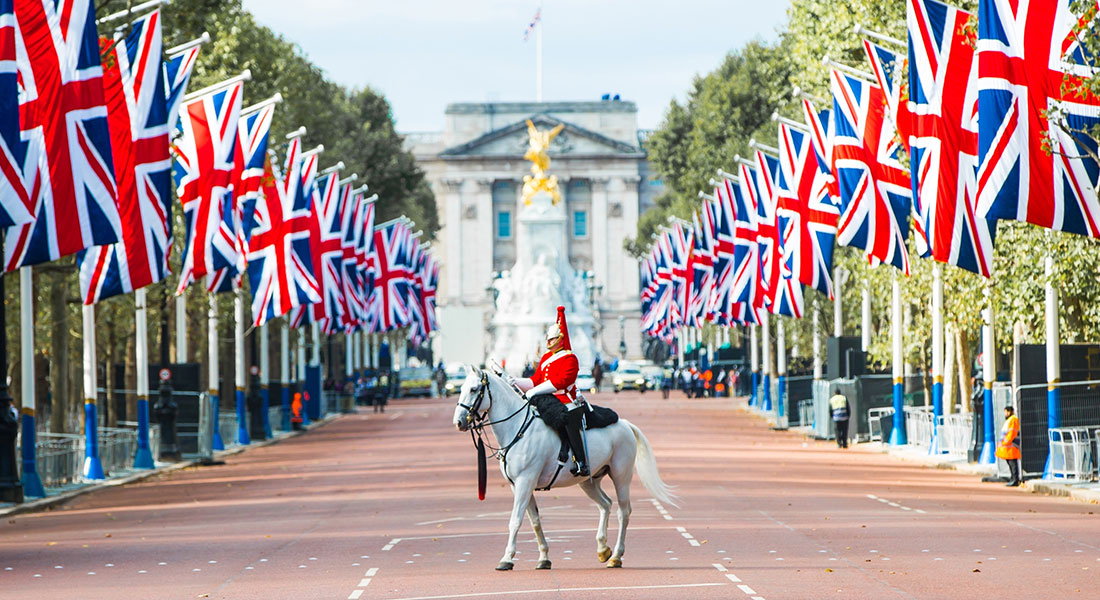Britishness has been on the decline since the colonies began to leave the Empire
When a number of British colonies demanded independence after World War 2, they kick-started the decolonisation process, which has since emptied the concept of 'Britishness' of meaning. Even Great Britain is falling apart because an increasing proportion of the population no longer calls itself British, concludes professor Stuart Ward’s in his new book Untied Kingdom - a Global History of the End of Britain.

In 1947, the British Royal Family marked the 21st birthday of the coming Queen Elizabeth in South Africa. Here, the young princess gave a famous speech to "all the peoples of the British Commonwealth and Empire", in which she claimed that even though she was many thousands miles from London, she was still at home.
But in 1947, according to Stuart Ward, who is professor of imperial history at the University of Copenhagen, the British Empire was already disintegrating. India was on the cusp of independence, and the princess's speech in South Africa was an attempt to sustain a British identity that no longer made sense for very many people.
"Britishness was a concept that was invented to give the many people who emigrated to the new colonies in the course of the 19th century an identity that could unite them; A Scotsman, Irishman or Welshman who moved to India in order to carry out a job on behalf of the colonial regime could therefore call himself British and feel part of a community of British people in Malaysia and South Africa – and also those who stayed at home in the United Kingdom," explains Stuart Ward. He elaborates:
“At the same time, Britishness was such an elastic concept that the colonized could create their own conceptions of what it meant. Barbados, which was the first overseas colony, was, for example, nicknamed Little England.”
A concept without content
As more and more colonies gained their independence during the second half of the 20th century, the concept of Britishness also became increasingly superfluous. In his new book Untied Kingdom – a Global History of the End of Britain, Stuart Ward follows this dismantling of British identity from the First World War and onwards.
“The content that gave 'Britishness' its meaning and power gradually disappeared. I myself am from Australia, and when I went to school in the 1970s, we still sang, as the most natural thing in the world, "God Save the Queen" every morning during assembly. This is completely inconceivable today,” says Stuart Ward.
According to Ward, Britishness was simply no longer a relevant concept at a time when an umbrella identity that could embrace people from many different parts of the world was no longer in demand.
"In fact, it is exactly the same process that we have been able to follow closely in the United Kingdom for many years. There are no longer many Scots who feel British. For example, the Scots have become accustomed to having their own parliament, and they have had their own legal system and their own church for a long time, so it will not feel like a huge step solely to identify themselves as Scots.”
Unsustainable self-contradiction
If you ask Stuart Ward what surprised him most during his work on the book, it is not that Britishness lost its meaning with the demise of the Empire:
"After all, it was almost inevitable when the global possessions, which were the reason why the concept of Britishness was invented in the first place, were no longer part of the United Kingdom. In fact, the most surprising thing is that the concept of Britishness has been able to hang together for so many centuries – because it is fundamentally based on a self-contradiction.”
By self-contradiction, Stuart Ward means that the colonisation of large parts of the world was based on the idea that British values such as democracy and liberalism should be disseminated to other parts of the world, if necessary by force. In fact, they had a duty to do so.
"However, the spread of these values required methods that were far from liberal. And after World War II, when Brits from all parts of the Empire had been involved in fighting Nazism, colonialism, and oppression of other people in general, simply became an unacceptable and unsustainable position.
Can Charles III save the day?
In a few days, Charles III will be crowned, 76 years after his mother's famous speech in South Africa. In contrast to the British Elizabeth, Charles is more conventionally English, says Stuart Ward.
"He can't draw on the same memories of a worldwide empire like his mother, and he doesn't enjoy the same broad appeal as her. His coronation will be a transition to a new and reduced royal remit, where the memories of the global monarchy will always loom in the background. And it will make it difficult for him to represent a multicultural and increasingly divided society."
Untied Kingdom – A Global History of the End of Britain has been published by Cambridge University Press.
Contact
Professor Stuart Ward
The Saxo Institute
University of Copenhagen
Phone: +45 30 30 81 64
Email: stuart@hum.ku.dk
Press officer Carsten Munk Hansen
Faculty of Humanities
Phone: + 45 28 75 80 23
Mail: carstenhansen@hum.ku.dk
